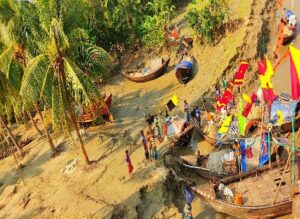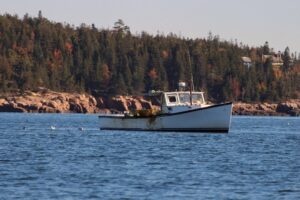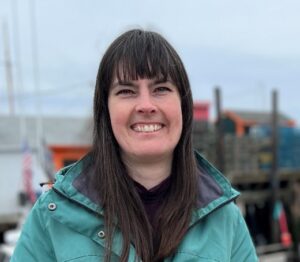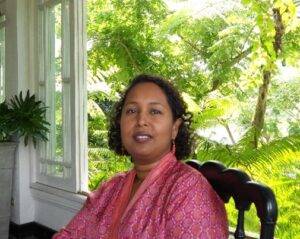By Moushumi Chaudhury (CARE USA), MD Khalid Hossian (Monash University), and Katherine Maltby (Gulf of Maine Research Institute). This blog stemmed from a session at the Adaptation Futures conference in Montreal, Canada in October 2023, where the authors shared these lessons on climate change adaptation and fisheries
Marine fisheries support fifty-six million people globally in providing food security and livelihoods. Ocean warming, however, has reduced fisheries productivity and this trend may continue, especially in tropical and temperate zones as marine organisms shift to colder waters[i]. Coastal storms and floods have also affected many fishing communities. This calls for creating enabling environments that support the fisheries sector to successfully adapt to climate impacts. This blog highlights examples from Asia, Africa, and North America where fisherfolk are adapting to climate change and lessons we can learn from three different contexts.
In Bangladesh, more than one million artisanal fisherfolk live in climate-vulnerable riverine and marine ecosystems. To support their climate change adaptation plans and processes, different agencies provide them with climate information including weather forecasts on temperature and precipitation, as well as information on climate-resilient alternative livelihoods. However, many fisherfolks in Bangladesh do not benefit from this climate information due to a lack of understanding of the ‘information ecosystem by the agencies that provide this information. Fisherfolk need information related to rapid onset events, such as floods and cyclones and not slow onset events like droughts. This lack of demand-driven climate information is due to agencies not conducting climate information needs assessments through participatory processes with fisherfolk and not co-generating knowledge or sharing approaches to understand the capacity of fisherfolks to use tools like mobile phones and the Internet. As such, to effectively verify, use and disseminate climate information, the artisanal fisherfolk community needs climate information ‘influencers’ within their communities and trusted community networks established under the leadership of information influencers. Through these actions, a stronger information ecosystem regarding climate impacts and adaptation options can be built for the artisanal fisherfolks in Bangladesh resulting in better climate information for adaptation decision making.

Marine fisherfolk at fish landing station in Bangladesh. Photo credit: MD Khalid Hossian
Fishing communities in the Northeast US are also facing significant climate impacts. American lobster is an iconic and valuable fishery, but stocks in southern New England (SNE) have declined since the late 1990s partly driven by climate change alongside other environmental factors. This has led to significant social and economic impacts on local and regional scales. Research at the Gulf of Maine Research Institute has found that SNE lobstermen have responded to declining lobster populations in many ways, including developing new fishing practices or adjusting their business operations. This includes altering their fishing grounds and changing the time they leave traps in the water. Others diversified their catch portfolios to species such as whelk or Jonah crab or gained additional incomes from alternative jobs outside of fishing. Others left lobstering completely to pursue new fisheries or alternative livelihoods. These findings hold useful insights for adaptation planning for the fishery. Firstly, fisheries management and resilience approaches need to cater for diverse strategies in how lobstermen adapt to allow for different individual capacities, needs and preferences. Secondly, identifying other diverse stakeholders beyond fisheries managers, for example non-profits or community groups working in mental health or job transitions and up-skilling, can provide additional information and support to lobstermen as they consider requirements and available options for their adaptation to future impacts.

Lobster fishing in New England. Photo credit: Katherine Maltby
Women in Tanzania are practicing “mariculture” or cultivation of marine animals and plants, such as seaweed, as an alternative to capture fisheries as an adaptation and livelihoods strategy. Seaweed can create a natural barrier for coastal protection, mitigating the strength of tidal waves. Even though women contribute significantly to the seaweed economy, cultural and social norms perpetuate gender inequalities in fishing communities where social taboos limit women’s ability to partake in decision making over management of seaweed[ii]. CARE analyzed gender relations among coastal communities and found that these discriminatory social and gender norms can be addressed at the local and national levels so that women are part of decision making. At the local level, women need to be included in interventions and discussions over mariculture management, provided with resources such as tubular nets to improve productivity and local ecosystem conditions, and supported to build women’s agency by promoting their ability to make decisions and act upon them. At the national level, the Government of Tanzania created an enabling environment to support women through a National Task Team to raise awareness, recognize, and document women’s role in small-scale fisheries[iii]. All these actions together led to transformative changes among the lives of women in the seaweed industry who contribute to climate and livelihood solutions.

Seaweed farming in Tanzania. Photo credit: Sebastian Jan
Across these different contexts and diverse coastal areas and seascapes, a common and essential factor for creating enabling environments for fisherfolk to adapt to climate change is to give voice to those impacted and include them in all stages of decision-making regarding adaptation solutions. Whether its fisherfolk in Bangladesh, women seaweed cultivators in Tanzania or lobsterman in the US, they make significant economic, social, and cultural contributions from local to global scales, and have unique knowledge, perspectives and voices that are vital to consider and act upon to help reduce the impacts of climate change on them, their communities and wider the fisheries sector. By listening to their concerns, governments and non-profits can better provide demand driven information, resources, skills, and support needed to enable fisherfolk to adapt. This can result in climate adaptation solutions that are centered on community needs and values, helping to sustain the fishing economy that provides food and jobs to millions of people around the world, despite increasing climate impacts.
About the Authors
Moushumi Chaudhury is a Senior Technical Advisor on Climate Justice at CARE USA. She designs adaptation projects around the world to support climate vulnerable people to have the tools and capacity to implement adaptation solutions. MD Khalid Hussian is a Research Fellow at Monash University in Australia where he works on different research projects related to environmental informatics and community informatics in developing countries including digital climate information services for marine fisherfolks. Katherine Maltby is a postdoc at the Gulf of Maine Research Institute, where she works on a range of projects focused on understanding climate change adaptation and resilience in fishing and coastal communities along the Northeast US coast.’
 Katherine Maltby
Katherine Maltby
 MD Khalid Hossian
MD Khalid Hossian
 Moushumi Chaudhury
Moushumi Chaudhury
[i] Free CM, Mangin T, Molinos JG, Ojea E, Burden M, Costello C, et al. (2020) Realistic fisheries management reforms could mitigate the impacts of climate change in most countries. PLoS ONE 15(3): e0224347. https://doi.org/10.1371/journal.pone.0224347
[ii] Fröcklin, S., de la Torre-Castro, M., Lindström, L. et al. Fish Traders as Key Actors in Fisheries: Gender and Adaptive Management. AMBIO 42, 951–962 (2013). https://doi.org/10.1007/s13280-013-0451-1
[iii] FAO (2020) https://www.fao.org/voluntary-guidelines-small-scale-fisheries/news-and-events/detail/en/c/1492299/
